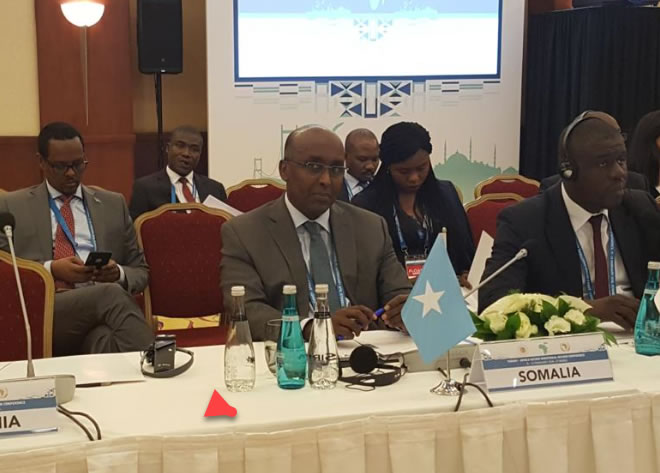by Dahir Salad Hassan
Tuesday July 4, 2023

Waging a well-thought out and systematic war on
corruption is paradigm-shift that would lead
to efficient, effective and
result-oriented public sector management as well as institutional check and
balance. Somalia’s current government is on the right track to increase
political accountability and retrace and re-claim the democratic values which
we championed the African continent as being a young, unified, an independent
country in the sixties (60).
Our own history admits that democracy not only ensures good and accountable government institutions with checks and balances, but also empowers the citizens to participate and hold their government accountable. Our forefathers fought for the liberation of the country from European colonial rulers, therefore, it us, our generation that must stand up and liberate the country from the extremist ideology and corruption.
Corruption is a dangerous epidemic that has a wide range of destructive effects on our society. It sidetracks funds intended for development, undermines the ability of governments to provide basic services, breast-feeds inequalities and injustices, while discouraging the trust to invest in the country's many resources such as oil, gas, blue-economy, large, divergent livestock, Unfortunately, these are resources that would eventually generate hard currency and will allow us to make better life decisions without being overly stressed about the financial fallout for the country and allow us to make better development decisions.
Enough is enough, corruption is the number one issue that triggers destruction of our moral values, justice and it endangers the stability of the system of governance and development. We need to look deeply at the connections and linkages between corruption and other forms of terrorism and organized crime, including money- laundering
The current Somali government has been paying increased attention to corruption and how to control it. For one thing, we all realize that corruption has very high costs for our society in particular since we are emerging from conflict. Corruption keeps the country in a cycle of weak governance, constant threat to fall back to conflict, and violence from armed groups and criminal networks like Al-Shabab. When money and resources that are available to the government are diverted by corrupt officials, instead of being channeled for the benefit of citizens and social protection services, it ruins all prospects of economic development. This, in turn, can create further instability and violence. Therefore, corruption, governance, and conflict are all intertwined.
Somalia is facing multifaceted setbacks which include, infestation of global terrorism in the country, as well as drought and famine where thousands of people die every year. Following this, there’s the rainy season, which comes with heavy floods which wreak havoc to communities. To break this cycle crisis and disaster, we must fight corruption.
The private gain obtained by corrupt public officials, who have been entrusted with guiding and implementing public policy and service, is at the expense of both the common good and of those who don’t cheat the system. In this sense, corruption is widely viewed as an immoral practice and must be dealt with severe punishment and long jail terms.
“ Where and how did you obtain this” must get to the ears of corrupt officials and every government institution must be assessed and audited. Corruption creates a system where money and connection determine who has access to public services and who receives favorable treatment. These practices have particular consequences in countries, like ours, emerging from conflict. Money collected through taxes and needed for development of public services, like roads, utilities, education, health care for all, and transportation, are diverted by greed and desire to survive and get ahead thoughtlessly.
Another public cost is that corruption is linked to the development of organized crime, including the involvement of criminals in money laundering and trafficking people and drugs.
Less known is the fact that Al-Shabab terrorist, for-example, are involved in drug trafficking and extortion of business, but also they are deeply involved in the illegal arms trafficking in the region.
Finally, corruption has links to conflict. Certainly, thirty years of conflict takes its toll on the government and people of Somalia, nevertheless, it’s rewarding that president Hassan Sheikh Mohamud declared a war to be waged against corruption. The success of this war will not only lead us to a rapid development and progress in Somalia, but it will pave the way that international organizations, such as INGO's and local NGO’s are also held accountable, with rigorous auditing and assessment of the whereabouts of billions of dollars these organizations received in the name of Somalia. With that, I am certain, the cycle of corruption, conflict, crises and disasters will be weakened to the margins of decline.
Corruption undermines the ability of the federal government of Somali to achieve the set goals and priorities for stabilization, good governance and development of the public services. It will also pave the way in allowing the public to trust and have confidence in governing institutions.
The Federal parliament, very specifically the upper-house, should attain the task to adapt laws that support the campaign against corruption. They should also hold the heads of federal member states accountable in their institutions and make them clean up corrupt individuals, powerful and competing groups, and networks of elites who have a mutual stake in corruption in the federal member states. This will exponentially increase the good will and the trust of the Somali people.
Dahir Salad Hassan
Burnsville, MN